
Indian Shi'ite Muslims burn an effigy of U.S. President George W. Bush during a protest in New Delhi February 24, 2006. Hundreds of Shi'ite Muslims protested against the upcoming visit of President Bush and denounce the bombings of Samarra's Golden Mosque. REUTERS/Adnan Abidi

Indian Shi'ite Muslims burn an effigy of U.S. President George W. Bush during a protest in New Delhi February 24, 2006. Hundreds of Shi'ite Muslims protested against the upcoming visit of President Bush and denounce the bombings of Samarra's Golden Mosque. REUTERS/Adnan Abidi

Indian Shi'ite Muslims burn an effigy of U.S. President George W. Bush during a protest in New Delhi February 24, 2006. Hundreds of Shi'ite Muslims protested against the upcoming visit of President Bush and denounce the bombings of Samarra's Golden Mosque. REUTERS/Adnan Abidi

Muslim protesters of Awami Party shout anti-Bush slogans as they demonstrate against U.S. President George W. Bush's visit in New Delhi, India, on Wednesday. (AP Photo/Saurabh Das)
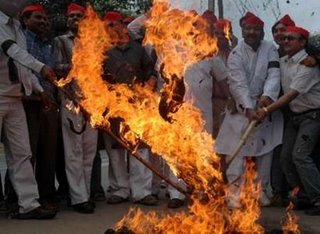
Activists from an Indian political party burn an effigy of U.S. President George W. Bush during a protest in the northern Indian city of Allahabad March 1, 2006. Bush arrives in India on Wednesday on his first visit to the world's largest democracy, hoping to elevate a new friendship between the two nations into a strategic partnership. REUTERS/Jitendra Prakash

Indian protesters burn a poster of U.S. President George W. Bush during a protest in the central Indian city of Bhopal March 1, 2006. Bush arrives in India on Wednesday on his first visit to the world's largest democracy, hoping to elevate a new friendship between the two nations into a strategic partnership. REUTERS/Raj Patidar
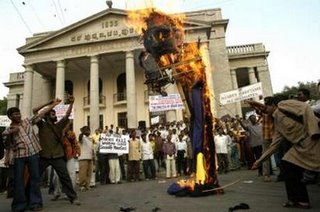
Indian workers from non-governmental organizations burn an effigy of U.S. President George W. Bush during a protest in the southern Indian city of Bangalore March 1, 2006. Bush arrives in India on Wednesday on his first visit to the world's largest democracy, hoping to elevate a new friendship between the two nations into a strategic partnership. REUTERS/Jagadeesh Nv
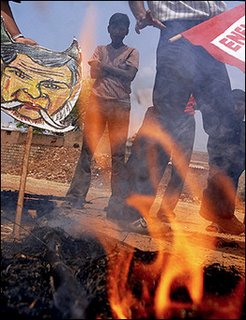
Indian activists of the left wing Socialist Unity Center of India (SUCI) shout slogans as they hold anti-US placards during a demonstration against the forthcoming visit to India by US President George W. Bush in Bangalore. Bush arrived in New Delhi, where tens of thousands of Muslims have protested his first visit to India(AFP/Dibyangshu Sarkar)
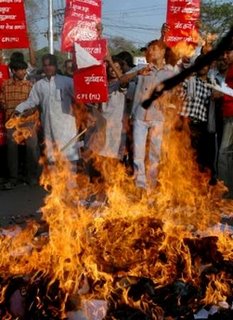
Activists from an Indian political party burn an effigy of U.S. President George W. Bush during a protest in the northern Indian city of Allahabad March 2, 2006. Bush was given a grand reception in India on Thursday as officials from both countries edged closer to a landmark nuclear deal and communist and Islamist groups vowed more mass protests. REUTERS/Jitendra Prakash

Indian-Muslims burn an effigy of U.S. President George W. Bush during a protest rally in Mumbai March 2, 2006. India and the United States sealed a landmark civilian nuclear cooperation pact on Thursday, the centrepiece of Bush's first visit to the world's largest democracy. REUTERS/Punit Paranjpe

Indian Muslims protesters burn an effigy of U.S. President George W. Bush during a protest rally in Mumbai March 2, 2006. India and the United States sealed a landmark civilian nuclear cooperation pact on Thursday, the centrepiece of Bush's first visit to the world's largest democracy. REUTERS/Punit Paranjpe
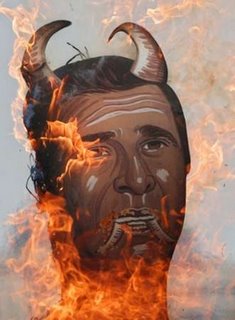
Indian men burn a caricature of U.S. President George W. Bush during a protest in the eastern Indian city of Kolkata March 2, 2006. India and the United States sealed a landmark civilian nuclear cooperation pact on Thursday, the centrepiece of President George W. Bush's first visit to the world's largest democracy. REUTERS/Parth Sanyal

Indian men burn effigies of U.S. President George W. Bush and Indian Prime Minister Manmohan Singh during a protest in the eastern Indian city of Kolkata March 2, 2006. India and the United States sealed a landmark civilian nuclear cooperation pact on Thursday, the centrepiece of President George W. Bush's first visit to the world's largest democracy. REUTERS/Parth Sanyal

Indians burn an effigy of U.S. President George W. Bush during a protest in the eastern Indian city of Kolkata March 2, 2006. India and the United States sealed a landmark civilian nuclear cooperation pact on Thursday, the centrepiece of President George W. Bush's first visit to the world's largest democracy. REUTERS/Parth Sanyal

Indians burn vehicles during a protest in the northern Indian city of Lucknow March 3, 2006. A Muslim man was shot dead in northern India on Friday as a protest against U.S. President George W. Bush spun out of control and triggered communal clashes with Hindus, police said. REUTERS/Pawan Kumar

A Kashmiri Muslim protestor throws a smoking teargas shell towards Indian policemen during a demonstration against US President George W. Bush in Srinagar. The new strategic partnership between the United States and India could transform the world, Bush said in a keynote address marking the end of his Indian visit, amid riots that left three dead and dozens injured.(AFP/Tauseef Mustafa)

No comments:
Post a Comment